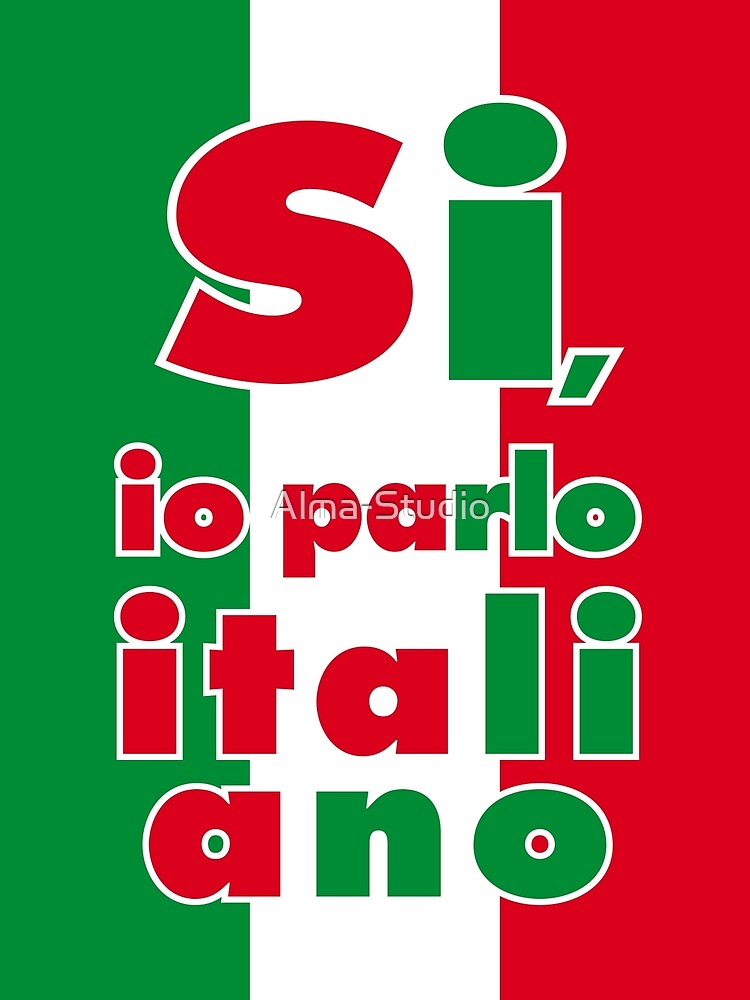
Do you think we can do it? - Certainly, no problem. ❼rees que podemos hacerlo? - Cierto, no hay ningún problema. Can you stop by the store on your way home? - Of course, no problem. ¿Puedes pasar por la tienda de camino a casa? - Por supuesto, no hay problema.
#Yes ispeak italian movie#
Do you want to go to the movies tonight? - Okay, what movie do you want to see? ¿Quieres ir al cine esta noche? - Vale, ¿qué película quieres ver? Do you feel like having a coffee? - Yes, great. ¿Te apetece tomar un café? - Sí, estupendo. Let’s start with a quick cheat sheet you can use for some of the most common words and expressions you’ll hear for saying yes in Spanish. The most common ways to say yes in Spanish If you’re looking for the best resources for learning Spanish, you’ll find the ones we recommend right here.

#Yes ispeak italian how to#
We’ll address both casual and formal scenarios, common points of confusion for beginners, how to add emphasis when saying yes, and more. This article will cover vocabulary and examples for saying yes in Spanish. It’s worth learning other ways to say yes in Spanish, so you know how to respond appropriately no matter the context. However, there are plenty more words to communicate a positive response, and sí may not always be the best choice. Now, sí is the most versatile word for saying yes, so you’ll hear it often as you begin to speak more Spanish.

Of course, one of the first words you’ll learn (and likely already know) is the most common word for yes in Spanish: sí. Just knowing how to say yes in Spanish can make everyday life easier – you’ll be able to answer questions, make new friends, and communicate your needs more efficiently. So, starting with the very basics of Spanish vocabulary is a worthwhile endeavor at any age.Īnd one of the most important building blocks for your Spanish vocabulary is learning how to say yes. However, they are considered Italophone minorities, limited to a few cities in the respective countries.You may have heard that it’s harder to learn a new language from scratch as an adult.īut, studies show that adults actually have more mental capacity for language learning than we give ourselves credit for. In the Swiss cantons of Ticino and Graubünden, Italian is even the sole official language today.Īlso as a result of migration, several Italian communities have emerged in Brazil, the United States, Canada and Australia in recent decades. Today, about half a million Swiss speak Italian. They made such an impact in southeastern Switzerland that Italian soon became the everyday language. Although the war did not result in any lasting border shifts, Italian guest workers were extremely welcome and equally numerous in Switzerland to the north. Postwar migration The Italian language experienced a remarkable spread during and after World War II. There are hardly any native speakers left. Today, Italian is only taught as a second language in the former colonies. Italian was established there as a language of commerce, but could hardly penetrate into the everyday life of the population. The main Italian colonies were in what is now Libya, Somalia and Eritrea. Distribution in the Italian Colonies Compared to the seafaring nations of Spain and Portugal, Italy remained rather frugal during the colonial period, concentrating on a few areas on the Adriatic and in Africa. In order to distinguish the individual dialect families from one another, they are usually divided into northern, central and southern Italian. There are numerous dialects, but all of them are based on the earlier Vulgar Latin.

With the beginning of the Middle Ages, this became the forerunner of today's Italian language, which until the 16th century was more and more combined into a single language.Įven today, however, even within Italy there are different expressions of the language. During the Roman Empire, Latin was still the official and used written language, but the people spoke a variation of it called Vulgar Latin, which differed more or less from Latin in the regions. Origin of the Italian language The Italian language developed from the Romance branch of the Indo-European languages, thus originating from the original Latin spoken in the Roman Empire.


 0 kommentar(er)
0 kommentar(er)
